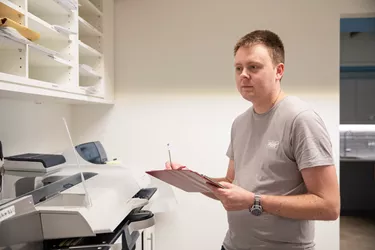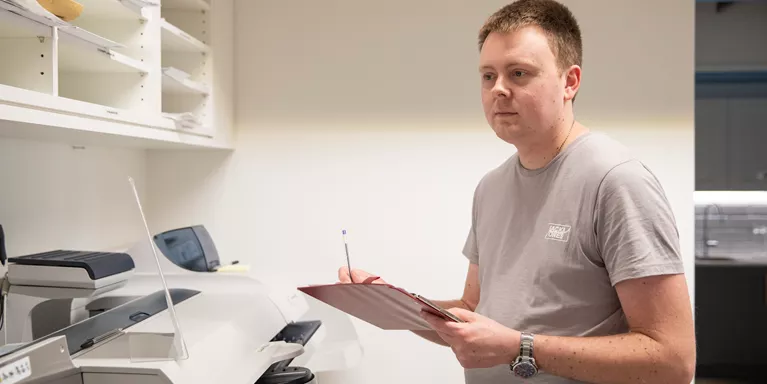How my boss helped me deal with panic attacks
Kirsty blogs about her anxiety at work, and the positive impact a supportive employer can make.
Kirsty is a blogger and vlogger, who produces content based on personal experiences. She hopes to challenge the stigma around mental health.
I love working in media. I am constantly learning, meeting new people, and travelling, but most importantly, I can be creative. With any role, you can be spread too thin and things can become overwhelming, but it is finding a place of work that can help with this.
"I began to feel out of breath, my heart began to race, and I felt as if I was going to collapse."
I realised I had anxiety when I was 15 years old, and it came at a time when I found my security had been taken. A lot had happened over a course of six years, and there was plenty more to follow. I found it hard to cope, but felt that I didn’t have any control of my life. One day, I was thinking about it all, and I then experienced my first panic attack. I began to feel out of breath, my heart began to race, and I felt as if I was going to collapse. I then continued to have these episodes, but just felt confused and unsure of what my body was doing. I did eventually seek help, but as I grew older, I had to learn to cope with this in a workplace environment.
I first started working in a smaller, independent agency. It was a new and exciting environment, but I always felt I had to prove myself. At first it was great, but I slowly got into the habit of working late and never really switching off. It felt like a constant wave of emotions but the saddest part was that I never really felt happy there.
I wasn’t coping very well, I stretched too thin, I wasn’t integrating well, but looking back, I had a lot happening, and no real help. The agency often spoke about being an open environment, embracing different personas and driving a whole new culture, but sadly it wasn’t the reality.
"I became quieter, lacked confidence and over compensated by becoming a people pleaser."
I remember I reached out to a member of management and explained what I was going through but they didn’t know how to address it. It then got to a stage where it all became too much, my mum was ill, I was unhappy and anxious, I had nobody to speak to, and it simply was brushed under the carpet. What was sad, was having someone so senior push aside my feelings - this had a major impact on me. I began to bottle things up and was really struggling. I became quieter, lacked confidence and over compensated by becoming a people pleaser. All I really wanted was for someone to help me.
I gave more time to the unhelpful and negative internal thoughts, but had no real escape. I wasn’t really given a chance I felt, at having that media experience. I thought I had an opportunity to work in media, be around like minded people and to work for a place where I was comfortable – sadly, it wasn’t the case.
Thankfully I was able to get out of that experience and move on to something more positive. Since working at The Financial Times I have had this opportunity. When I began my new role, my experience in my old role impacted my confidence. I once felt so anxious I wanted to just stay in bed and hide from everything. I was keeping my feelings in, and could see I was going down that rabbit hole again. I knew I needed to change this, so I set up a meeting with a senior member of staff.
I feared I would be judged, or have the same reaction as before, so didn’t know how to start the conversation. “I have been feeling really anxious,” I said, like word vomit - I felt liberated.
The best part of it, was that what I thought would be an awkward conversation, turned out to be the best conversation. We talked through it all, discussed how they could help me and was even asked if I wanted to work from home, or try a different way of working, to make myself comfortable. I was shocked! No brushing it under the carpet! By his reaction, I realised how normal it was to discuss this topic here, and how much the business cared about having a happy and healthy work environment.
Now I am fortunate enough, to be able to speak to anybody here about my anxiety. It has soon become obvious that anxiety will only lose its stigma if you can start having these open conversations. The fear I once had, has changed since I joined the Financial Times and I am so thankful for that. We spend more time at work, than at home, so we do need to find a place we comfortable in.
"Being more open about my mental health, it has helped me to embrace my anxiety; I talk about it, I blog about it and help others."
Since being more open about my mental health, it has helped me to embrace my anxiety; I talk about it, I blog about it and help others. My anxiety helps to push me to challenge the stigma and do things outside of my comfort zone. By starting the conversation, I have been able to work out what makes me happy/unhappy at work, and address that too. Bottling things up, only means you are suffering in silence, which can only have a negative impact. The Financial Times has opened my eyes, to understanding we all have the right to say how we feel and to be taken seriously – no matter what role or company we work for.
Please bear in mind that it is important to find a working environment that can help you when you’re not having a good day. You spend a large majority at work, so your wellbeing must always come first. Many workplaces are now working towards this, but there is still more that needs to be done.
The Financial Times goes above and beyond to make sure everyone is comfortable at work - we have regular one to ones with senior management, have an on-site mental health first aiders - who are trained staff who have volunteered to help other staff, and are always encouraged to leave at a reasonable time, take our breaks and use the gym at lunch time. These are all important factors, and are things that you need to research before joining a company.
"We should never feel ashamed of mental health."
Most importantly, my work has become a strong support system. My work colleagues have become like family and there is a mutual respect in how we treat one another.
So, if you can take one thing away from this, is that we should never feel ashamed of mental health. Speak up about it and find a place of work that you can, if you feel you can’t talk about your mental health, it is not the right place for you.


Information and support
When you’re living with a mental health problem, or supporting someone who is, having access to the right information - about a condition, treatment options, or practical issues - is vital. Visit our information pages to find out more.
Share your story with others
Blogs and stories can show that people with mental health problems are cared about, understood and listened to. We can use it to challenge the status quo and change attitudes.

















